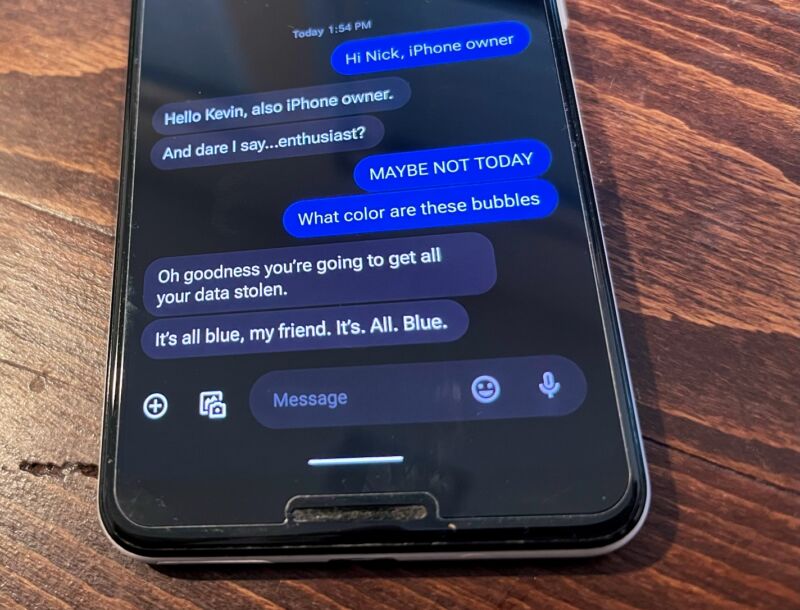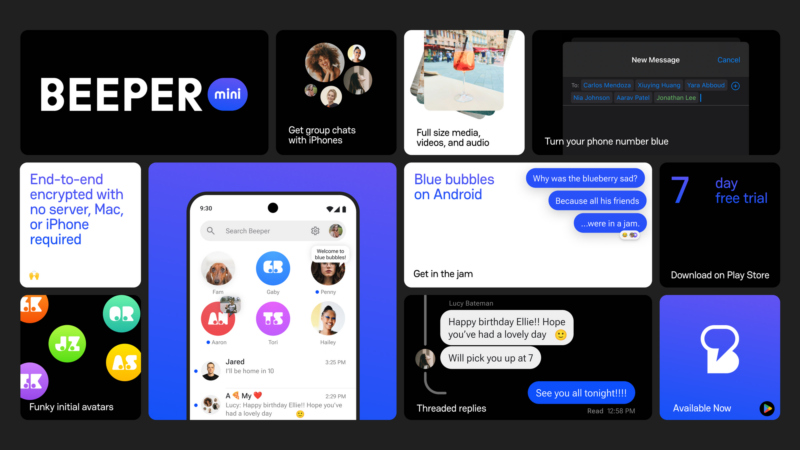
Whistle
Beeper Mini, an Android app created as a result of reverse engineering Apple’s iMessage service, is currently down, after Apple took action to block it.
Beeper desktop users received a message from co-founder Eric Migicowski late Friday afternoon, indicating “iMessage service outage” and that “messages are failing to send and receive.” Reports started piling up on Reddit around 2:30 PM ET. As of 5:30 p.m., both Beeper Cloud on desktop and the Beeper Mini app reported errors sending and receiving messages, with the message “Search failed on server: Search request timed out.”
Migicovsky suggested to The Verge and TechCrunch Friday that Beeper’s data indicates action on Apple’s part to block the service. Late Saturday, Apple provided a statement to The Verge that it had already done so. Apple “has taken steps to protect our users by blocking technologies that exploit fake credentials in order to access iMessage,” the statement said. Citing “exposure of metadata and enabling spam, spam, and phishing attacks,” Apple stated that it “will continue to make updates in the future to protect our users.” (Ars has reached out to Apple for comment on the details of this message and will update this post with new information.)
Reached by phone on Sunday, Migicovsky took issue with Apple’s statement, especially the allegations regarding security concerns. “In reality, [Beeper Mini] “It has increased security and reduced exposure for Apple users,” especially compared to standard SMS texting, Migicowski said. Migicowski said Beeper did not allow spam, spam or phishing, and he also said Beeper does not use “fake credentials.” That Beeper’s core iMessage technology has its source code available on GitHub, and that with the guarantee of an outside research firm, his company will provide its Android source code to Apple or other interested parties.
Migicowski also questioned why Apple, which typically makes few public statements about such matters to the press or public, would go out of its way to comment on its attempts to confront Beeper.
Beeper Cloud, the multi-service desktop chat app that recently switched to using the same tools as Beeper Mini for its iMessage service, was up and running as of Sunday morning. Migicovsky said work continued Sunday to get Beeper Mini for Android back online.
respond to Share on X (formerly Twitter) asked on Saturday whether restoring the Beeper Mini’s functionality would be an “endless game of cat and mouse.” “Mijkowski wrote: “Beeper Cloud and Mini are two must-have apps. We built it. We’ll keep it working. We will share it widely.He added that such an attitude “especially from people in the technology world” surprised him.Why do hard things at all? Why keep working on something that doesn’t work the first time?“

Beeper, where it was running shortly before its launch on December 5, sends iMessages from your Google Pixel 3 Android phone.
Kevin Purdy
Beeper’s ability to send encrypted iMessages from Android phones developed as a result of a teenager’s reverse engineering of the iMessage protocol, Ars explained at the launch. The app couldn’t read the contents of messages (and Apple couldn’t), kept encryption keys and contacts on your device, and didn’t require an Apple ID for authentication.
However, the app sent a text message from a device to an Apple server, and the response was used to generate an encryption key pair, one for Apple and one for your device. The Beeper service itself kept a connection with Apple’s servers to notify it and notify you of new messages. Reddit user moptop and others suggested that the Beeper service used encryption algorithms whose keys were spoofed to look like they came from a Mac Mini running OS Beeper staff have said on Reddit and elsewhere that an explanation should be given as to what was blocked and how to deal with it.
The iMessage capabilities of the Beeper Mini, which the company was planning to charge $1.99 per month for a seven-day trial, were more than just a feature. The company had planned to build additional secure messages into Beeper Mini, including Signal and WhatsApp messages, and make them the primary focus of its efforts. Its previous app Beeper, which was temporarily renamed to Beeper Cloud, was flagged for deprecation at some point in favor of the new iMessage-touting Mini app.
This post was updated at 12:50pm on Saturday, December 9, to reflect functionality restored to Beeper Cloud (desktop), and Migicovsky’s social media response following the outage. It was updated again at 12:35 PM on Sunday, December 10, with Apple’s statement about its efforts to counter Beeper, and Migicovsky’s comment on it.
Apple has recently made the decision to block the Beeper Mini’s iMessage Android app, causing disappointment and frustration for many users. Despite this setback, Beeper has announced that they will continue to pay and find a way to bypass the blockade. This development has sparked a debate about the challenges and limitations of integrating messaging platforms across different operating systems. This controversy has put a spotlight on the growing need for interoperability and seamless communication between iOS and Android devices.

